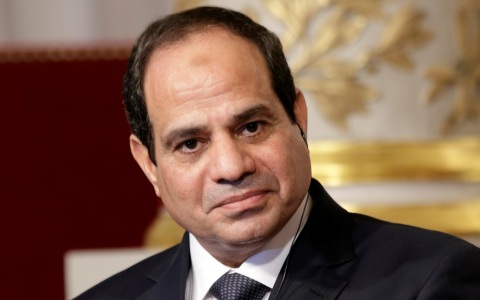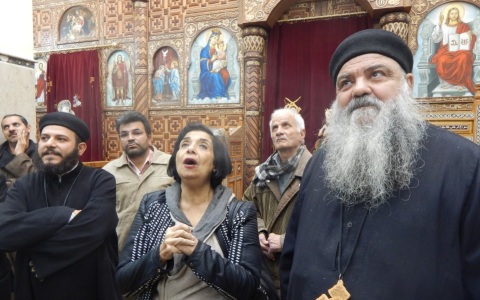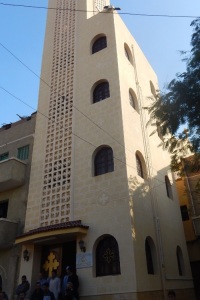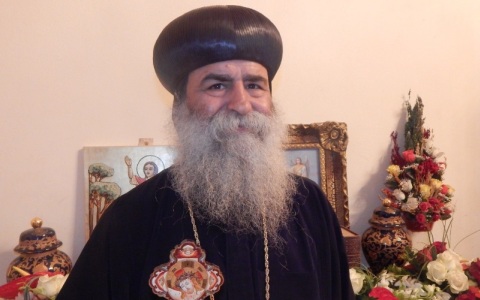Strength in weakness: Egypt president’s apology spurs hope
by - 10th February 2016

HUMBLE St George’s Church in Belhasa south of Cairo became a home for dogs and goats after its destruction by pro-Morsi supporters during Egypt’s 2011 revolution.
Now it’s been reopened better than ever – thanks to a surprise announcement by Egypt’s President.
‘This is a beautiful gesture for a new age’, said Bishop Biemen, Head of Crisis Management for the Coptic Orthodox Church. ‘We have been pampered’.
President Abdel Fattah al-Sisi visited the Coptic Cathedral in Cairo on 6 January - Coptic Christmas Eve - for the second year running. Amid raucous applause he did the most un-presidential thing: he apologized.
‘We have taken too long to fix and renovate the churches that were burned’, the President told Copts, one of the oldest Christian communities in the world. ‘God willing, by next year there won’t be a single house or church that is not restored.’
On 14 August, 2013, six weeks after then Defense Minister Sisi deposed President Morsi, military and police units violently dispersed his supporters as they staged two sit-in protests in Cairo.
Over the next three days angry Islamists ransacked dozens of Christian establishments across the country.
In Belhasa, 240 kilometers south of Cairo, youths climbed the roof of the neighbouring school and hurled firecrackers and Molotov cocktails into the church.
‘We prayed, we cried, we were in a difficult situation’, Malak Ishak, a 40-year-old middle school teacher, told Lapido. ‘God, why did you let your house burn?’
The tiny community of Christian farmers and labourers abandoned the building which was charred beyond recognition, and lamented its fate.
And for the next three Christmases they trudged country roads to worship in Kom al-Akhdar village four kilometers away.
After the initial attacks Sisi immediately promised that the military would cover the costs of all reconstruction.
But progress was slow and some Copts began to complain. Local media also questioned if the job would get done.

But on 14 January, one week after the President’s apology, St George’s Church was reopened. Refurbished with top-of-the-line construction material and additional floors, engineers also included a sprinkler system and fire alarm.
 Fr Yuannis Anton from nearby village Qufada had helped Belhasa church get its license in 1999, after it was converted from a simple village home.
Fr Yuannis Anton from nearby village Qufada had helped Belhasa church get its license in 1999, after it was converted from a simple village home.
Now drawing on his biblical heritage, he praised the generosity of the military, which covered the £270,000 cost of restoration.
‘We were very sad when the church was burned,’ he said. ‘But we held to what Jesus once said, “You do not realize what I am doing now, but later you will understand”.’
Village relations with Muslims were now much better than in the time of Morsi, teacher Malak Ishak said.
Priority
Bishop Biemen echoed this theme about the country as a whole.
Consecrated in 1961 and an engineer by background, the Bishop was chosen to coordinate the nationwide effort with the Army Corps of Engineers.
Priority was given to churches that were the only ones to serve a given area.
Consideration was also given to the security situation, with the army not being placed in situations where confrontation with still-angry pockets of Morsi supporters might occur.
Stage one involved ten locations and was originally scheduled to be completed by the anniversary of Morsi’s ouster. But there were delays until the end of 2014.
Stage two incorporated the remaining 33 locations, ten of which were made a priority. But these few took all of 2015.
Reports circulated in the press about materials being dumped. Other reports cited local priests saying their burned churches had not been registered.
‘As the army procrastinated there was grumbling from Copts that the job was not getting done,’ said Ishak Ibrahim, Religious Liberty Officer for the Egyptian Initiative for Personal Rights.
‘But since Sisi’s announcement there has been a renewed push on the part of the armed forces.’

Bishop Biemen agreed, but took the blame for the delays.
‘We have the responsibility to plan and redesign the churches, not the army,’ he said. ‘Before God and my conscience, we were working the whole time.’
Popular confusion came from two misunderstandings, he explained. The project only involved locations damaged during the three-day melée. And after supplying initial materials, the army then paid upon completion.
But since Christmas the final phase has begun in earnest. It even includes the church in Arish, in troubled northern Sinai where the army remains in conflict with an ISIS affiliate, he said.
In total the army will pay out £16.5 million on 65 locations including 52 churches and 21 additional religious buildings.
But though he said it had not been needed, Bishop Biemen is most encouraged by an apology that runs counter to much of Egyptian culture.
‘Many people view saying sorry as an act of weakness,’ he said. ‘That the President did so is a big deal, and shows us our country appreciates us and is worth defending.
‘As the Egyptian proverb says, “We have been patient, but then received everything we need”.’
